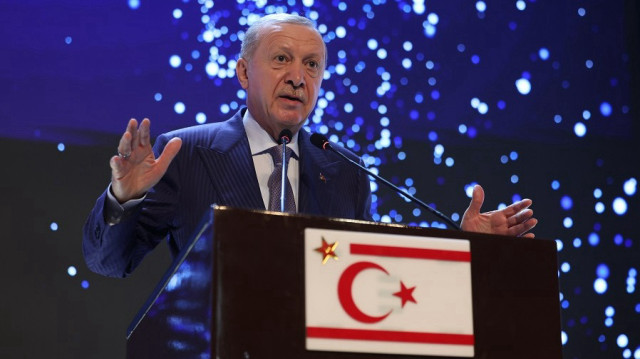
Türkiye fully supports efforts for 2-state solution on Cyprus, says Recep Tayyip Erdogan, adding that it is high time the global community comes to terms with realities on ground
Türkiye's president on Sunday called for more diplomatic, political, and economic ties with the Turkish Republic of Northern Cyprus, saying that the “decades of injustice” against the Turkish Cypriots must end.
“No matter which door they close to block the Turkish Cypriots' path, we have always found new doors to open, new paths to take,” Recep Tayyip Erdogan said in an address at a groundbreaking ceremony in the TRNC's capital Lefkosa marking the 51st anniversary of the 1974 Cyprus Peace Operation.
Türkiye fully supports efforts for a two-state solution on Cyprus, said Erdogan, adding that it is high time the global community comes to terms with the realities on the divided island.
"We firmly believe that this will happen sooner or later,” he said.
Erdogan also underlined the importance of tourism for the TRNC's economic growth and its visibility on the world stage.
“We have made the TRNC a shining star of the Eastern Mediterranean not only in transportation but also in tourism, employment, and investment,” he said.
He stressed that Ankara stands in full harmony with President Ersin Tatar and the nation's government in building the Turkish Republic of Northern Cyprus' political and economic future.
- Cyprus Peace Operation
Cyprus has been mired in a decades-long dispute between Greek Cypriots and Turkish Cypriots, despite a series of diplomatic efforts by the UN to achieve a comprehensive settlement.
Ethnic attacks starting in the early 1960s forced Turkish Cypriots to withdraw into enclaves for their safety.
In 1974, a Greek Cypriot coup aimed at Greece's annexation of the island led to Türkiye's Peace Operation as a guarantor power to protect Turkish Cypriots from persecution and violence. As a result, the TRNC was founded in 1983.
It has seen an on-and-off peace process in recent years, including a failed 2017 initiative in Switzerland under the auspices of guarantor countries Türkiye, Greece, and the UK.
The Greek Cypriot Administration entered the EU in 2004, the same year that Greek Cypriots single-handedly blocked a UN plan to end the longstanding dispute.







